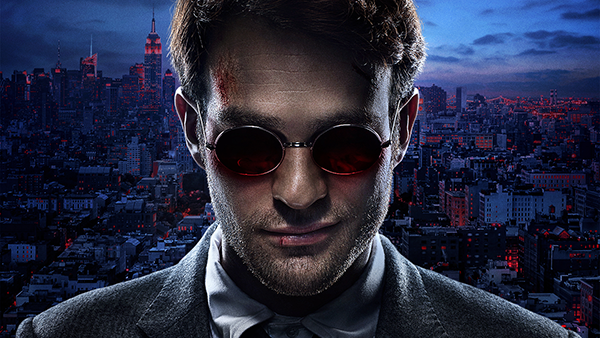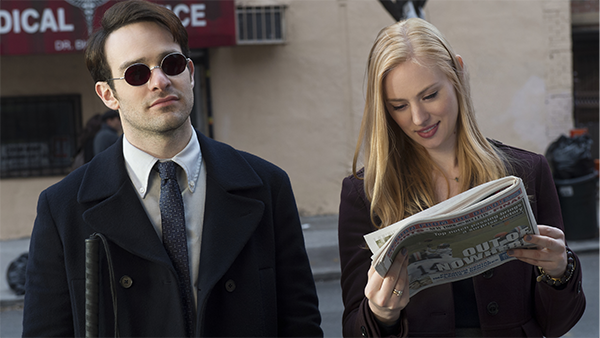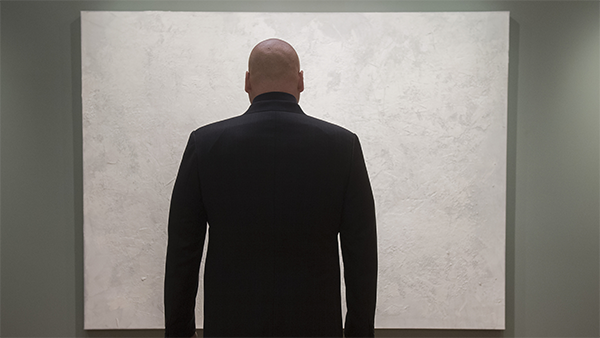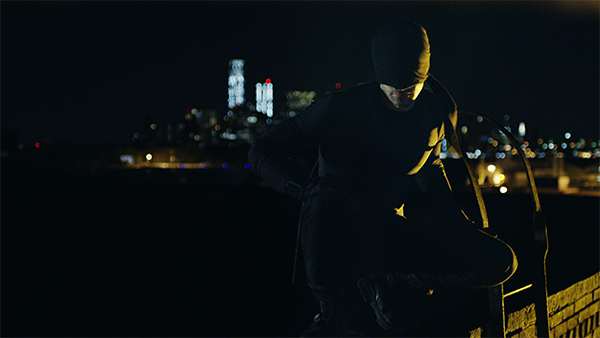Marvel's Daredevil Review: Welcome to the Darker, Bloodier, Awesomer Corner of the Marvel Universe
Marvel's Daredevil S01E01, S01E02, S01E03, S01E04, and S01E05:
"Into the Ring," "Cut Man," "Rabbit in a Snowstorm," "In the Blood," and "World on Fire"

Editor's Note: This review covers the first five episodes of Marvel's Daredevil and will contain mild spoilers. If you wish to go in blind (heh), we suggest navigating over to Netflix, watching the episodes, and then returning to read the review!
Marvel's Daredevil is unlike anything Marvel has ever done before; it's also unlike any comic-based series currently taking up residence on your DVR. For many of you, comparisons to Arrow will be unavoidable given Daredevil's similar premise, but thanks to the latter's bigger budget and freedom from the restrictions of broadcast television, it handily outdoes the The CW's take on Oliver Queen. The story of a violent vigilante is best left unfettered by the standards and practices of primetime, and while Arrow has done a fine job of operating within them, the benefits of existing outside their limits become increasingly clear after spending just a short amount of time in Daredevil's grim, oppressive world.
I've seen five of the show's 13 episodes, and I feel comfortable in stating that you've never seen the likes of Daredevil and its stylized violence and darkness in any of Marvel's big-screen blockbusters. In the hands of executive producer and showrunner Steven S. DeKnight (Spartacus)—who took over for series creator Drew Goddard (Buffy the Vampire Slayer, Angel) relatively early in the production process—Daredevil is slick and polished in a way that belies the gritty realism of its Hell's Kitchen setting and the urban crime element at its core.

For those unfamiliar with the origins of Daredevil's title character, played here by Charlie Cox, his civilian name is Matt Murdock, a lawyer-by-day, vigilante-by-night who went blind at a young age after saving a man from being hit by a truck that was hauling dangerous cargo. The radioactive substance that took his sight as a result of the accident fine-tuned his other senses beyond normal human abilities, allowing him to "see" in other ways. This "enhancement," when combined with his impressive fighting skills in martial arts and boxing, make him a man without fear.
If you had any doubts about whether Cox could handle such a big role—prior to Daredevil, the actor's most notable credit was on HBO's Boardwalk Empire, where he played minor-ish character Owen Slater for two seasons—they'll likely disappear fairly quickly. Cox embodies Murdock's dual nature with ease, bringing depth and range to the character as he pivots effortlessly between a charming lawyer who always seems to know when a beautiful woman is present and the threatening vigilante who isn't above using violence and torture to get what he wants. Cox does a wonderful job of portraying Murdock and Daredevil as two distinct characters, but not so distinct that they don't feel like they can't exist within the same man.
The series helps him achieve this through its smart use of flashbacks, which give viewers a look at Murdock's upbringing with his father. "Battling Jack" Murdock (John Patrick Hayden) was a struggling boxer who was once willing to take a few dives to provide for his young son, but was later murdered after he refused to throw a fight; the flashbacks to Murdock's life with his dad help establish his character and his motivations, while also serving as a reminder that the Murdock men can take a few punches, but always get back up. This tenacity becomes apparent early on, in Episode 2, when Murdock single-handedly confronts a group of Russians to rescue a kidnapped child, despite having a number of wounds, including broken ribs.

But while Cox/Murdock is obviously and understandably Daredevil's main player, the series is dedicated to its strong ensemble cast. Vincent D'Onofrio (Law & Order: Criminal Intent) stars—and nearly steals the show—as formidable businessman Wilson Fisk, a.k.a. Kingpin. Kingpin is one of Daredevil's archenemies, and the series is every much his origin story as it is Daredevil's; unseen for the first couple of episodes (in which his righthand man, Wesley, acts as a conduit), the character makes his first imposing appearance at the end of Episode 3, when he buys a painting from a good-looking woman in an art gallery. As Fisk, D'Onofrio carries himself with a silent but menacing presence, and when he speaks, he does so with a few, carefully chosen words. This only serves to magnify the fear he instills—not just in his enemies, but also in those who work for him.
No one speaks Fisk's name out loud, like he's this universe's version of Voldemort, and after one of his men gives up his name to Murdock, the guilty party willingly impales his head on a spike rather than face punishment from Fisk. Considering the guy who kills himself is someone who we've already seen bash another man's head in with a bowling ball, this is saying something. And just to further underscore Fisk's volatile nature, he later uses a car door to decapitate a man for interrupting a dinner date. Like Murdock, Fisk is attempting to "revitalize" the rundown Hell's Kitchen—but with a focus on controlling and profiting from it instead of cleaning up its streets—and like Murdock, he's also working outside the limits of the law.
But not everything about Daredevil is so dark. Murdock's best friend and law partner, Foggy Nelson (Elden Henson of the Hunger Games and Mighty Ducks franchises) is on hand to provide comedic relief, and True Blood's Deborah Ann Woll shines as their client-turned-secretary Karen Page. Karen's intimate knowledge of the corruption of her former employer—a construction company hired to rebuild Hell's Kitchen after the Battle of New York—lead to her being framed for the murder of a co-worker, and when the charges don't stick, the criminal masterminds behind the entire operation attempt to kill her, too. It's that tragic experience that drives her story throughout the first portion of Season 1 and puts her in touch with veteran journalist Ben Urich (Vondie Curtis-Hall), who's investigating the corrupt company... which also has ties to Fisk. While Karen is traditionally a love interest for Murdock in the comics, she doesn't appear to be one on the series, at least not at the outset. That role falls to Rosario Dawson's Claire Temple, a nurse who finds herself drawn into Murdock's after-dark activities after a particularly bad night leaves him beaten and bleeding in a dumpster.

Visually, Daredevil looks fantastic. The show reminds me of Bryan Fuller's exquisitely crafted drama Hannibal in terms of how it strategically plays with light and shadows to create tight spaces and heighten the suspense as it offers an unvarnished look at urban crime in the dilapidated world of Hell's Kitchen. You won't even recognize the New York of Marvel's own Agents of S.H.I.E.L.D. in comparison to the much gloomier version presented here. In fact, it's easy to forget that Daredevil exists within the same cinematic universe as Iron Man, Captain America, and Phil Coulson. Aside from a few easter eggs, which include framed newspapers in Urich's office and vague references to magic hammers and an "incident" in New York, Daredevil doesn't feel like part of the Marvel Cinematic Universe at all. If the Avengers represent Marvel on a global scale, Daredevil represents Marvel on a more localized and intimate level, with its hero hitting the streets to combat crime at its roots.
And because that hero doesn't wear a fancy flying suit or wield a magic hammer, he must employ other "tactics" to carry out his mission. The result is a bevy of hand-to-hand combat scenes that aren't too far behind those on Cinemax's Banshee, and should at least satiate fans' hunger. Daredevil's fights are dirty and messy and feel more like brawls than the tightly choreographed assaults that viewers have come to expect from TV and film, and while they sometimes go on a bit too long, they account for some of the best and most exhilarating moments of the entire series.
Daredevil's pulpy feel is a perfect fit for Murdock's story, bringing a neo-noir sense of flair to a series that appears to have more in common with Christopher Nolan's Batman trilogy than any of the other comic adaptations currently on television. Fans of the genre are likely to binge Season 1 without complaint, but if you're the type who doesn't understand why the bad guys don't just shoot Murdock—he's blind, after all!—then you're either new here or you should be watching something that didn't originate in the pages of a comic book. While Daredevil does feel realistic on many levels, it still requires fans to suspend disbelief for a bit.
When the series begins, the Daredevil persona is still being formed, as evidenced by the fact that Murdock isn't running around New York in a red devil costume, but a black uniform that covers half his face. However, he's always lurking beneath the calm exterior of Murdock's lawyer facade, and you can catch a glimpse of him in the series' opening scene, when Murdock goes to confession and explains to the priest that he sometimes has to "let the devil out." Murdock isn't asking to be absolved for his past sins, he's seeking forgiveness for the ones he's about to commit. And that's Daredevil in a nutshell: The series is asking viewers to forget the past and everything they thought they knew about Marvel and the traditional roles of heroes and villains, and to embrace this dangerous new series that's paving the way for the next chapter of Marvel's overtaking. And if the company's next four Netflix series are anything like this one, there's no need for forgiveness, I'm all in.
NOTES
– Daredevil's opening credits are pretty great, featuring symbols of New York, the justice system, and more, but like Netflix's other opening credits sequences, they're a little too long. I didn't find myself trying to fast-forward through them the way I do with the company's other programming, but they add another minute to the runtime.
– That was definitely Teen Wolf's Deucalion (Gideon Emery) who got his head smashed in and then chopped off with a car door.
– According to Vladimir, one of the Russians, no one says Fisk's name because "it would betray that he's just a man."
– Was the "billionaire playboy" line a reference to Tony Stark or just, you know, life?
– Another Banshee comparison that came to mind while watching: Burton > Wesley.


